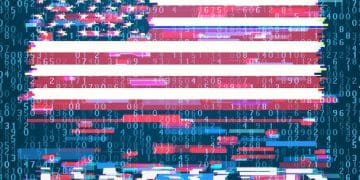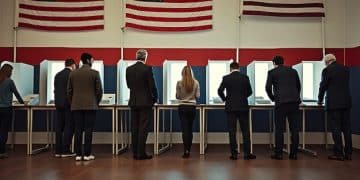US Diplomatic Strategies to Counter Foreign Disinformation Campaigns

The US employs a range of diplomatic strategies to counter disinformation campaigns from foreign adversaries, including public diplomacy, sanctions, cybersecurity cooperation, supporting media literacy, and working with international organizations to establish norms and expose malicious actors.
In an era defined by the weaponization of information, the United States faces an ongoing challenge from foreign adversaries seeking to undermine its interests through disinformation campaigns. Understanding What are the Diplomatic Strategies the US is Using to Counter Disinformation Campaigns from Foreign Adversaries? is crucial for safeguarding democracy and national security. This article explores the key diplomatic approaches the US is employing to combat this threat, providing insights into their effectiveness and future directions.
Understanding Foreign Disinformation Campaigns
Foreign disinformation campaigns represent a significant threat to national security and democratic processes. These campaigns often aim to sow discord, manipulate public opinion, and undermine trust in institutions.
The Nature of Disinformation
Disinformation differs from misinformation in its intent. While misinformation is simply false or inaccurate information, disinformation is deliberately spread to deceive. Foreign actors use various tactics, including creating fake accounts, spreading propaganda through social media, and exploiting existing social divisions.
- Social Media Manipulation: Using bots and fake accounts to amplify false narratives.
- Exploitation of Divisions: Targeting vulnerable populations with tailored disinformation.
- Cyber Attacks: Hacking and leaking sensitive information to discredit individuals and institutions.
Combating these campaigns requires a multi-faceted approach, including diplomatic strategies that address the root causes and mitigate their impact.

Public Diplomacy Initiatives
Public diplomacy plays a crucial role in countering disinformation by promoting accurate information and fostering trust in US values and policies. These initiatives aim to directly engage with foreign audiences, providing an alternative to the false narratives spread by adversaries.
Promoting Accurate Information
One key aspect of public diplomacy is the dissemination of factual information through various channels, including traditional media, social media, and cultural exchange programs. US embassies and consulates around the world actively engage with local media to provide accurate reporting and counter disinformation.
The State Department also funds programs that support independent journalism and media literacy, helping citizens distinguish between credible sources and propaganda.
Cultural Exchange Programs
Cultural exchange programs, such as the Fulbright Program and the International Visitor Leadership Program (IVLP), foster mutual understanding and build relationships between the US and other countries. By bringing foreign leaders, students, and professionals to the US, these programs provide firsthand exposure to American values and institutions.
- Fulbright Program: Academic exchanges that promote research collaboration and cultural understanding.
- International Visitor Leadership Program (IVLP): Professional exchanges that connect emerging leaders with their US counterparts.
- Educational Initiatives: Supporting educational programs that promote critical thinking and media literacy abroad.
These initiatives help build resilience against disinformation by fostering informed citizens who are less susceptible to manipulation.
Imposing Sanctions and Economic Measures
Sanctions and economic measures are powerful tools the US uses to deter and punish foreign actors engaged in disinformation campaigns. These measures can target individuals, entities, and even entire countries that are complicit in spreading false information.
Targeting Disinformation Actors
The US government has imposed sanctions on individuals and entities involved in creating and disseminating disinformation. These sanctions can include asset freezes, travel bans, and restrictions on financial transactions. By targeting those directly responsible, the US aims to disrupt their operations and send a clear message that such activities will not be tolerated.
For example, sanctions have been imposed on Russian individuals and entities associated with the Internet Research Agency (IRA), which was responsible for spreading disinformation during the 2016 US presidential election.
Economic Restrictions
In addition to individual sanctions, the US can impose broader economic restrictions on countries that support disinformation campaigns. These restrictions can include trade embargoes, export controls, and limitations on access to international financial institutions.
- Trade Embargoes: Restricting trade with countries that engage in disinformation activities.
- Export Controls: Limiting the export of technology and equipment that could be used for spreading disinformation.
- Financial Restrictions: Limiting access to international financial institutions like the World Bank and the International Monetary Fund (IMF).
These measures aim to weaken the economic capabilities of states that support disinformation, making it more difficult for them to finance and conduct these campaigns.
Cybersecurity Cooperation and Information Sharing
Cybersecurity cooperation and information sharing are essential components of the US diplomatic strategy against disinformation. By working with allies and partners, the US can enhance its ability to detect, attribute, and respond to disinformation campaigns.
International Partnerships
The US collaborates with other countries to share information about disinformation tactics and techniques. This includes sharing intelligence about foreign actors involved in spreading false information and coordinating responses to specific campaigns.
For example, the US works closely with European allies through organizations like the European External Action Service (EEAS) to counter Russian disinformation.
Cybersecurity Agreements
The US has signed cybersecurity agreements with several countries to establish norms of behavior in cyberspace and promote cooperation in combating cyber threats, including disinformation. These agreements often include provisions for sharing information, coordinating responses, and providing technical assistance.
- Information Sharing: Sharing intelligence and data about disinformation activities.
- Joint Operations: Conducting joint cyber operations to disrupt disinformation campaigns.
- Capacity Building: Providing technical assistance to help allies improve their cybersecurity capabilities.
These agreements enhance the collective ability of the US and its allies to defend against disinformation and promote a more secure and resilient information environment.

Supporting Media Literacy and Independent Journalism
Supporting media literacy and independent journalism is a critical long-term strategy for countering disinformation. By empowering citizens with the skills to critically evaluate information and supporting independent media outlets, the US can help create a more resilient information ecosystem.
Media Literacy Programs
The US supports media literacy programs around the world that teach citizens how to identify and resist disinformation. These programs often focus on teaching critical thinking skills, fact-checking techniques, and media evaluation methods.
USAID, for example, funds programs that support media literacy education in countries vulnerable to disinformation campaigns.
Supporting Independent Journalism
Independent journalism plays a vital role in holding power accountable and providing accurate information to the public. The US supports independent media outlets through grants, training programs, and technical assistance.
- Grants and Funding: Providing financial support to independent media outlets.
- Training Programs: Offering training and resources to journalists to improve their skills and reporting capabilities.
- Technical Assistance: Providing technical support to help media outlets operate securely and effectively.
By supporting media literacy and independent journalism, the US can help create a more informed and resilient citizenry that is less susceptible to disinformation.
Working with International Organizations
Working with international organizations is a key component of the US diplomatic strategy against disinformation. These organizations provide a platform for coordinating international efforts, establishing norms, and holding malicious actors accountable.
Establishing International Norms
The US works with international organizations like the United Nations (UN) and the Organization for Security and Co-operation in Europe (OSCE) to establish norms of behavior in cyberspace and promote responsible use of information technologies. These norms aim to prevent the spread of disinformation and protect democratic processes.
The US also supports efforts to develop international guidelines for social media platforms and other online intermediaries to combat disinformation while respecting freedom of expression.
Coordinating International Efforts
International organizations facilitate coordination among countries in addressing disinformation campaigns. This includes sharing information, conducting joint investigations, and coordinating responses to specific threats.
- Information Sharing: Sharing intelligence and data about disinformation activities.
- Joint Investigations: Conducting joint investigations to identify and expose disinformation actors.
- Coordinated Responses: Coordinating diplomatic and economic responses to deter disinformation campaigns.
By working with international organizations, the US can leverage the collective resources and expertise of the international community to combat disinformation more effectively.
Future Directions and Challenges
The fight against disinformation is an ongoing challenge that requires continuous adaptation and innovation. The US must continue to refine its diplomatic strategies and address emerging threats.
Adapting to New Technologies
Disinformation actors are constantly developing new tactics and technologies to spread false information. The US must stay ahead of these trends by investing in research and development to detect and counter new forms of disinformation, such as deepfakes and AI-generated content.
This includes developing new tools for fact-checking, content verification, and media literacy education.
Addressing Root Causes
Combating disinformation requires addressing the underlying factors that make societies vulnerable to manipulation. This includes promoting education, strengthening democratic institutions, and addressing social and economic inequalities.
- Promoting Education: Investing in education to improve critical thinking skills and media literacy.
- Strengthening Institutions: Supporting independent judiciaries, free press, and transparent governance.
- Addressing Inequalities: Reducing social and economic inequalities to build more resilient societies.
By addressing the root causes of vulnerability, the US can help create a more resilient global information environment that is less susceptible to disinformation.
| Key Point | Brief Description |
|---|---|
| 🌍 Public Diplomacy | Promotes accurate information and US values through engagement. |
| 💰 Sanctions | Targets actors involved in spreading disinformation. |
| 🤝 Cybersecurity Cooperation | Enhances detection and response through global partnerships. |
| 📰 Media Literacy | Empowers citizens to critically evaluate information. |
Frequently Asked Questions
▼
The primary goal is to protect US national security and democratic processes by countering false narratives and promoting accurate information globally.
▼
Sanctions deter and punish foreign actors involved in creating and spreading disinformation by freezing assets and restricting their financial activities.
▼
It enhances the ability to detect and respond to disinformation campaigns through information sharing and coordinated efforts with allies and partners.
▼
Media literacy programs equip citizens with critical thinking skills to identify and resist disinformation, fostering a more resilient information ecosystem.
▼
They provide a platform for coordinating international efforts, establishing norms, and holding malicious actors accountable on a global scale, enhancing collective action.
Conclusion
The US employs a comprehensive array of diplomatic strategies to combat foreign disinformation campaigns, combining public diplomacy, economic sanctions, cybersecurity cooperation, and support for media literacy and international partnerships. As technology evolves and new threats emerge, these strategies must adapt to protect democracy and national security effectively.





